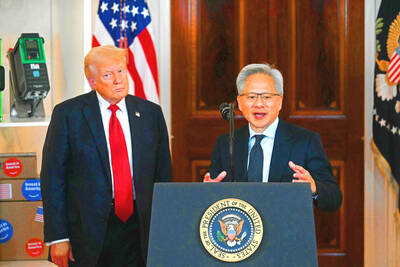Nine years after its previous visit, hit musical Mamma Mia! came to Taiwan again for five shows between Friday and Sunday. The three-day event took place at the Linkou Stadium of Taoyuan’s National Taiwan Sport University, where tens of thousands of fans were entertained by the amusing tale of family and friendship.
The term “mamma mia,” which literally means “oh my mother,” is an Italian expression for various emotions such as surprise, joy and fear. Inspired by Swedish pop group ABBA’s timeless hit songs, British playwright Catherine Johnson’s story unfolds on a small Greek island, and revolves around a bride-to-be’s relationship with her mother and her attempts to find her father.
With more productions playing simultaneously around the world than any other musical, Mamma Mia! is the world’s best-selling show. Since its stage premiere in 1999, the musical has grossed over US$200 million (about NT$6 billion). More than 60 million people in over 440 cities have seen the show.

Photo courtesy of KHAM Inc.
照片︰寬宏藝術提供
(Eddy Chang, Taipei Times)
睽違九年後,熱門音樂劇《媽媽咪呀!》再度登台,於上週五至週日一連演出五場。三天的表演在桃園市國立體育大學的林口體育館登場,這齣關於家庭與友情的喜劇,把台下數萬名觀眾全都逗樂了。
「媽媽咪呀」一詞,照字面上的意思就是「我的媽呀」,這個義大利說法可用來表達多種情緒,例如驚訝、開心和害怕。受到瑞典流行樂團ABBA的暢銷曲所啟發,英國劇作家凱薩琳強生筆下的這齣劇,在一座希臘小島展開,劇情圍繞著一位準新娘和她母親的關係,以及尋找生父的過程。
《媽媽咪呀!》由不同製作團隊、在世界各地同時演出的次數,比其它任何音樂劇都還要頻繁,可說是全球最賣座名劇。自一九九九年首演以來,已熱賣超過兩億多美元(六十億台幣),並於四百四十個城市上演,觀賞人次超過六千萬。
(台北時報張聖恩)

When Nvidia CEO Jensen Huang revealed on Friday last week that the company is working with the Trump administration on a new computer chip designed for sale to China, it marked the latest chapter in a long-running debate over how the US should compete with China’s technological ambitions. The reasoning has sometimes changed — with US officials citing national security, human rights or purely economic competition — but the tool has been the same: export controls, or the threat of them. Nvidia believes it can eventually reap US$50 billion from artificial intelligence (AI) chip sales in China. But it so far has

Long before numerals and arithmetic systems developed, humans relied on tally marks to count. These simple, repeated marks — often just straight lines — are one of the earliest and most widespread methods of recording numbers. Archaeological findings suggest that humans began tallying in prehistoric times. During the Late Stone Age in Africa, humans began to carve notches onto bones to create tangible records of quantities. One of the earliest known examples is the Wolf bone, an artifact unearthed in Central Europe in 1937. This bone bears notches believed to be an early form of counting. Even more intriguing

Continued from yesterday(延續自昨日) https://www.taipeitimes.com/News/lang In many Western countries, the most common form of tally marks employs a five-bar gate structure: four vertical lines followed by a diagonal slash. To form this group, one begins by drawing four parallel vertical lines, each representing one. For the fifth, draw a diagonal line across the existing four. This diagonal stroke effectively creates a distinct group of five. To continue counting, just initiate a new cycle in the same manner. A set of five tallies combined with a single vertical line next to it represents the number six. Across many Asian countries, the Chinese character

In 2024, multiple airplane accidents caused severe casualties, including a Jeju Air disaster at the year’s end. However, not all incidents ended in tragedy. Early in the year, a Japan Airlines flight caught fire after landing in Tokyo, but all 379 passengers and crew members escaped within 90 seconds. This event highlights the “golden 90 seconds” that experts emphasize — most survivors evacuate the plane within this critical window. Proper preparation ensures you can act quickly and decisively during these crucial moments when every second counts. Your survival strategy begins before takeoff. Wear long pants, a comfortable top, and